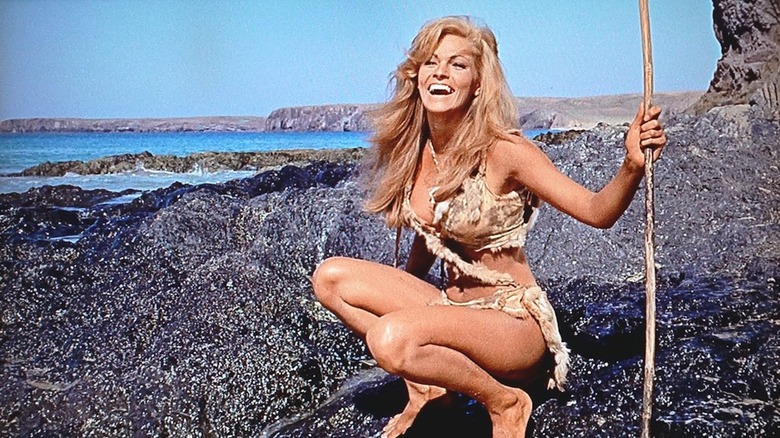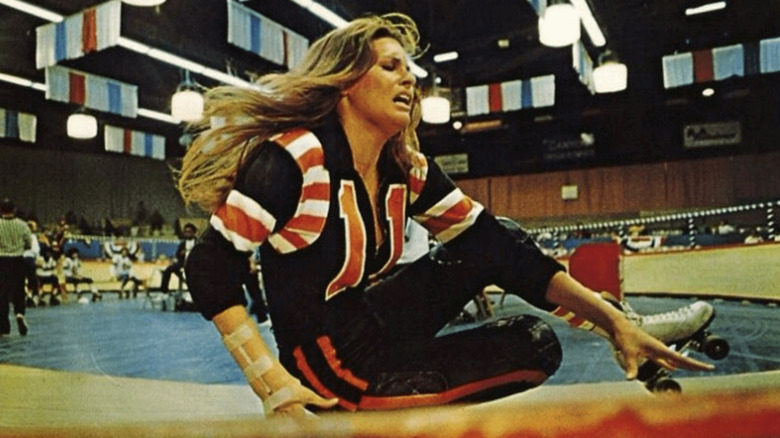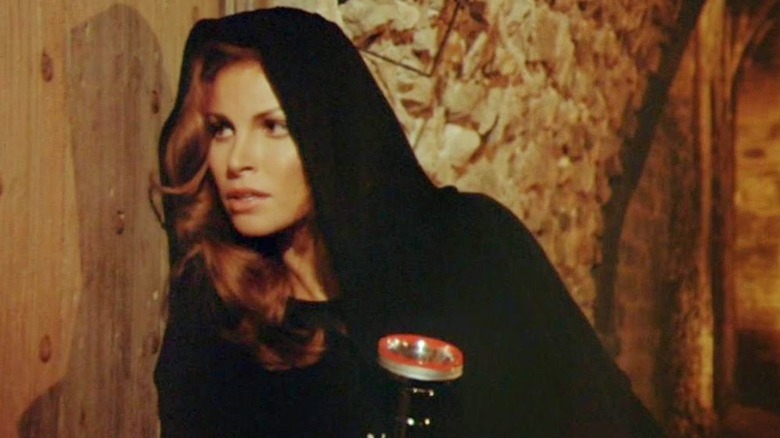Raquel Welch, Actress And Model Known For One Million Years B.C., Has Died At 82
Raquel Welch, the movie star and model Playboy declared "the most desirable woman of the 1970s," has died at the age of 82. According to her manager, Steve Sauer, (via CNN) Welch passed away after a "brief illness."
Welch was a much-buzzed-about Hollywood ingenue throughout the early 1960s before attaining international stardom in 1966's sci-fi classic "Fantastic Voyage" and the prehistoric Hammer flick "One Million Years B.C." While the latter movie did little to enhance her reputation as an actor, the sight of Welch in a two-piece deerskin bikini made her the pin-up heir to Marilyn Monroe.
Welch's physical beauty was undeniable, and she embraced her sex symbol status. But the Latina performer, who adopted her first husband's last name to avoid the kind of typecasting that drove Rita Moreno from Hollywood at the height of her popularity, knew she was more than just a pretty face, and proved it time and again throughout her career. Her feisty portrayal of dressmaker Constance Bonacieux in Richard Lester's delightful "The Three Musketeers" earned her the 1974 Golden Globe for Best Motion Picture Actress in a Musical or Comedy, while her 1981 Broadway debut in the musical-comedy adaptation of George Stevens' "Woman of the Year" likely would've earned her a Tony had she originated the lead role (she replaced Lauren Bacall).
Welch openly, aggressively combated ageism in the 1980s, and paid an infuriatingly high price for challenging industry sexism. She became an entertainment icon, a living legend at a time when many of her superstar peers were receiving plaudits for playing their age and/or against their established type. From 1990 until her death, Raquel Welch had to be Raquel Welch. She played the part with eloquence and dignity, and didn't complain much because she was a survivor. But Ms. Welch was done horribly wrong.
A sex symbol and damn proud of it
Born Jo Raquel Tejada on September 5, 1940 in Chicago, Illinois to aeronautical engineer Armando Tajada and Joesphine Sarah Hall, Welch pursued ballet early in her life when her family moved to San Diego, California. An instructor discouraged Welch from continuing her dance study due to her body type, so she turned her focus to beauty contests, many of which she won. She matriculated to San Diego State College in 1958, and majored in theater, but she dropped out after landing a job as a weatherwoman on a local CBS affiliate.
Hollywood agent Patrick Curtis took Welch under his wing in the early 1960s, and branded her as a sex symbol. According to a 1972 BBC interview, Welch approved of this approach. "[As a child] I never really thought of myself as pretty-pretty," she said. "But when I got a little bit older and the equipment arrived ... well, then, I thought, 'Gee, this is pretty terrific, maybe I ought to try it out a little.'"
Curtis also encouraged her to adopt her husband's last name, and the sleight-of-hand worked. After an impressive Life Magazine photo spread, and her initial success in "Fantastic Voyage" and "One Million Years, B.C.," Welch was basically viewed as white. When she shot a love scene with African-American movie star Jim Brown in 1969's "100 Rifles," bigots the world over hit their fainting couches over the verboten interracial coupling.
A sex symbol who literally called the shots
While Welch was a willing participant in the selling of her beauty, she drew clear lines with her directors. When Tom Gries asked her to go nude for her memorable shower scene in "100 Rifles," she said no. When Hugh Hefner pleaded with her to appear in the altogether for her 1979 Playboy spread, she refused. Hefner realized she was right, observing, "Raquel Welch, one of the last of the classic sex symbols, came from the era when you could be considered the sexiest woman in the world without taking your clothes off. She declined to do complete nudity, and I yielded gracefully. The pictures prove her point."
Welch's run in the 1970s got off to a controversial start with Michael Sarne's adaptation of Gore Vidal's wild satire "Myra Breckinridge." Welch stars as a transsexual dynamo who seeks stardom in Hollywood, and while it's a star-studded blunder along the lines of "Candy" or "The Magic Christian," Welch imbues the film with a carnal intellectualism that could've been harnessed by a better director. She's too smart for the movie.
As the New Hollywood era kicked in, Welch seemed more at home in genre flicks. Aside from the aforementioned "The Three Musketeers," she popped in mainstream-aiming entertainments like "The Beloved," "The Last of Sheila" and the roller-derby melodrama "Kansas City Bomber" (wherein Welch cemented her two-fisted diva reputation, parodied on "Seinfeld," by trading punches with Helena Kallianiotes).
A career compromised by ageism and corruption
One of Welch's proudest career moments was, alas, the one that made her persona non grata in Hollywood. When she was fired from David S. Ward's 1982 adaptation of "Cannery Row," she disputed MGM executive David Begelman's excuse that she had behaved unprofessionally and was only suing because she was becoming increasingly unemployable due to her age. Welch marshaled loads of evidence to the contrary, and won a $10.8 million verdict in 1986.
That Welch would essentially be blacklisted for speaking truth to the shadiest of powers – Begelman, despite a humiliating embezzlement scandal that led to his dismissal from Columbia Pictures in the late 1970s, was somehow given a shot to run a struggling MGM – was an egregious wrong that could've been righted at any point over the last 40 years. Welch returned to Broadway as Liza Minnelli's replacement in "Victor/Victoria," but why was no one developing a comeback show built around this remarkably talented pop cultural legend? Why didn't someone like Quentin Tarantino, whose "Kill Bill" was inspired by Welch's portrayal of a vengeful widow in Burt Kennedy's "Hannie Caulder," give her the third-act she deserved?
In the end, it feels like Raquel Welch was more than happy to just be Raquel Welch. She turned up on talk shows, and engaged in good-natured banter. Welch was a survivor and a trailblazer. She left us wanting so much more, but that's showbiz.



